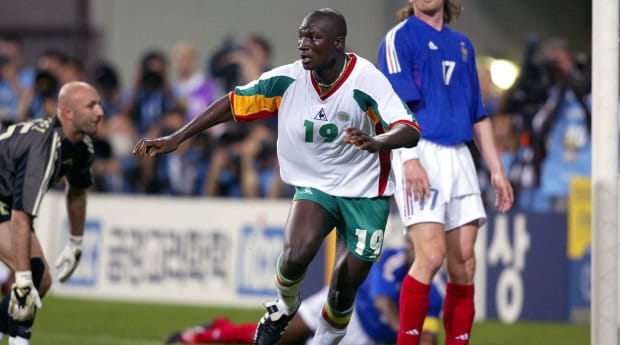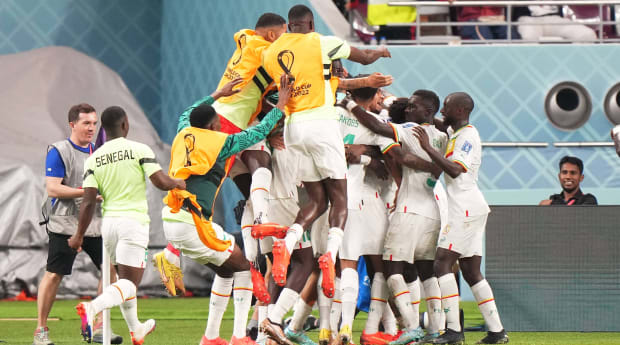On the two-year anniversary of their 2002 tournament star’s death, the Lions of Teranga put together another iconic moment by advancing to the knockouts in Qatar.
Before kickoff Kalidou Koulibaly had written the number 19 in black marker on his yellow captain’s armband in tribute to Papa Bouba Diop, who had died two years ago today at the age of 42. It was Diop who, wearing the number 19 shirt, had scored the most famous goal in Senegal’s history, poking in the winner as Senegal beat France in the opening game of the 2002 World Cup, its first ever match in the tournament. But it was what Koulibaly did after 70 minutes that stands as the greater tribute.
Koulibaly’s volley to restore Senegal’s lead against Ecuador in its 2–1 win is not quite of the same significance as Diop’s goal, but it is certainly in the pantheon. It secured Senegal’s passage to the last 16 of the World Cup for the first time in 20 years and, given no African side made it through the group in Russia, represented a significant marker for the continent as a whole. There is a serious possibility now that, for the first time ever, three African sides could make it to the last 16.
“The trophy’s for the family of Papa Bouba Diop,” said Koulibaly after being named man of the match. “I will give them this trophy because they deserve it. We knew the anniversary of his death was very important. We wanted to make him proud, pay homage to him. He was very important for Senegalese football. He made me dream as a boy, he was an inspiration to all the team. We wanted to do him honor. I saw the videos his family posted and it really hit home.” Koulibaly also dedicated the award to the victims of a recent landslide in Ischia, Italy, near his club team, Napoli.

IMAGO/Ulmer
“Bouba has not been with us for two years,” said the Senegal coach Aliou Cissé, who was part of the 2002 squad. “It goes without saying this win was for him. But we could dedicate this victory to lost of people. I would like to mention Bruno Metsu, the coach who took us to the last 16 for the first time 20 years ago, and lots of other people.”
As it did at the Cup of Nations earlier this year, Senegal is growing into this tournament. Defeat to the Netherlands came after a solid display was undermined by the concession of two late goals. The win over Qatar was, barring a sensational save from Édouard Mendy, largely run-of-the-mill, but this was a thoroughly convincing display against a side that had beaten Qatar easily and really troubled the Netherlands.
This, it should be said, was not the Ecuador of the opening two games. The back three used in the impressive draw against the Netherlands was gone, as manager Gustavo Alfaro reverted to the back four he had deployed against Qatar, but in a 4-3-3 shape rather than 4-4-2. But there was no thrust to Ecuador’s counters while Senegal repeatedly caused a threat from wide areas, particularly down the left.
Ismaïla Sarr was by far the biggest danger in the first half, and it was a burst in from the left by the Watford forward that brought the opening goal. Piero Hincapié had had a good World Cup, but he mistimed his challenge on Sarr, barging him over to concede a penalty that Sarr himself converted with casual ease.

IMAGO/Pressinphoto
“We didn’t use our usual style,” said Alfaro. “You have to have composure to make good decisions on the pitch. We had to have more possession. And more pace. If we wanted to equalize, I told them we needed to play.”
Ecuador changed shape at halftime, making two substitutions and adopting the 4-4-2 it has used against Qatar. Slowly, as Senegal sought to protect a lead, Senegal dropped deeper and Ecuador started to have the territorial advantage. Ecuador still hadn’t really created anything though when Idrissa Gana Gueye was booked for catching Gonzalo Plata in the face with his shoulder, ruling Gueye out of the last-16 tie, which would have been his 100th cap.
That suddenly seemed an academic concern, though, as the free-kick led to a corner, which Félix Torres flicked on for Moisés Caicedo to tap in, played onside by Youssouf Sabaly who had remained on the post as everybody else pushed out. Senegal had gone out on fair play to Japan four years ago and, looked like going out early again after playing well. But two minutes after ceding the advantage, Senegal seized it back. Gueye’s free-kick cannoned off Enner Valencia and Koulibaly smashed in a volley.
Cissé is usually extremely composed but, in the technical area, he allowed himself four or five seconds of wild celebration before collecting himself and looking to focus minds again. His leadership over the past seven years has been essential to Senegal’s progress.
But this was Koulibaly’s day and, most of all, Diop’s day.